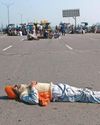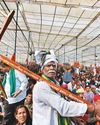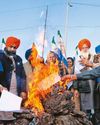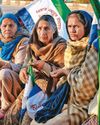
DURING a recent encounter with a prominent Indian photojournalist in Delhi, who, upon learning about my Kashmiri identity, eagerly declared, “Development is making its way in Kashmir.” I listened, patiently waiting for her to finish as she shared that one of her friends working for an NGO in Kashmir had told her so.
“Kashmiri people want jobs and education, and now they are finally getting them,” she continued, eventually asking for my thoughts. I looked her dead in the eye and asked if she had ever heard of the Kashmiri-American poet Agha Shahid Ali. She nodded yes, and I quoted from one of his poems— “They make a desolation and call it peace.”
Since August 5, 2019, when the Indian government stripped Jammu and Kashmir of its statehood and autonomy by abrogating Article 370 and Article 35A, there has been a notable increase in surveillance and a clampdown on press freedom in Kashmir, and hence, enforced silence, echoing themes from George Orwell’s dystopian novel 1984. Orwell’s work, which explores totalitarianism, propaganda, and the suppression of dissent, provides a framework to understand the implications of these measures on journalism and freedom of expression in Kashmir.
Big Brother is Watching
In 1984, Orwell introduced the concept of “Big Brother,” a figurehead representing the omnipresent surveillance state. In Kashmir, the increased surveillance post-abrogation of Article 370 manifests through heightened monitoring of journalists, restrictions, and limitations on internet access.
هذه القصة مأخوذة من طبعة June 11, 2024 من Outlook.
ابدأ النسخة التجريبية المجانية من Magzter GOLD لمدة 7 أيام للوصول إلى آلاف القصص المتميزة المنسقة وأكثر من 9,000 مجلة وصحيفة.
بالفعل مشترك ? تسجيل الدخول
هذه القصة مأخوذة من طبعة June 11, 2024 من Outlook.
ابدأ النسخة التجريبية المجانية من Magzter GOLD لمدة 7 أيام للوصول إلى آلاف القصص المتميزة المنسقة وأكثر من 9,000 مجلة وصحيفة.
بالفعل مشترك? تسجيل الدخول

Between Life, Death and Protest
The strain of sustaining a long protest is evident among farmers at Khanauri, but the sense of community remains strong

Protest 2.0
Farmers still have hopes from their leaders, but time is running out. The enemies, in the meanwhile, are sharpening their weapons

Trajectory of Nowhere
In the context of space and time, who are we humans and do we even matter?

All of God's Men
THE ongoing Maha Kumbh at Prayagraj is a spectacle, a photo op, and an emotion and manifestation of the mixing of spirituality and faith.

Embers Rekindled
While the recent death by suicide of a farmer has rendered the mood sombre at Shambhu border, the protests have picked momentum at the call of the unions

Time for Course Correction
What the protest by Punjab's landed peasantry tells us about the state's economy and society

The Untouchable
The ideological chasm between Ambedkar's vision and the Hindutva worldview remains irreconcilable

Frontliners
A day in the life of women protesting at Shambhu border

The Farmer-Composing Antagonist
Farmer leader Jagjit Singh Dallewal has been on a fast-unto-death at Khanauri border to pressurise the government to fulfil its promises to the farming community

Till Death Do Us Part
Jagjit Singh Dallewal has reinforced how a fast unto death can serve as a warning and an appeal to the public and the government